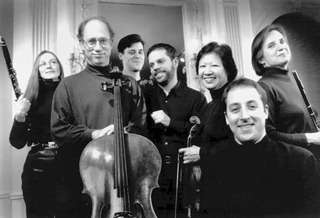|
Back
Spectral Summits New York
Merkin Concert Hall
05/29/2012 -
Annelies van Parys: Fragrance
Franco Donatoni: Ave
Philippe Hurel: Step
Gérard Grisey: Vortex Temporum
New York New Music Ensemble, James Baker (conductor) 
New York New Music Ensemble (© New York New Music Ensemble)
Celebrating its 35th anniversary, the New York New Music Ensemble proved in this concert its supreme mastery of the most virtuosic of contemporary scores. A well-oiled machine under the fearless and precise leadership of conductor James Baker, it repeatedly flexed its collective muscle in an entrancing program. It is a shame that there were so few of us mere mortals in the audience, but those lucky enough to attend left transfigured.
The program consisted of European "favorites" from the group's repertoire, and the love and dedication to all of the works was clear. Each composer on the program has at least some connection to spectralism. Even Donatoni, not consciously a disciple of the movement, fits in nicely, thanks to his uncanny ear for timbre and resonance as well as the obsessive nature of his music.
Annelies van Parys, the least familiar name of the night, constructed an evocative architecture in her Fragrances, composed for the NYNME in 2008. The composer writes that the work represented a move towards a "more extroverted" way of composing and that the piece has "lots of drive." This is certainly true compared to the only other work of hers I've heard, the beguiling Drifting Sand for string trio. This initial step outside of the comforts of stasis that imbue that work was mostly satisfactory, beginning high up in piccolo and string harmonics and sweeping down the harmonic series in a typical but effective spectral gesture. A whimsical second section built up quite a bit of "drive" and led to a recontextualized recapitulation of sorts. The abrupt ending, not quite satisfactory, is likely a quirk of the piece's new direction, one that the composer, so in control of every other aspect of the piece, will undoubtedly conquer in future projects.
Franco Donatoni's Ave harked back to the opening of the van Parys work, with high-lying piccolo, glockenspiel and celesta creating primordial star music. Donatoni's music requires rhythmic precision and an ability to shift gears extremely quickly, and the trio of musicians here played with utmost accuracy. They relished the variety of textures that Donatoni draws from his limited ensemble and also emphasized the playfulness inherent in many of his pieces.
Step, another work originally written for the NYNME, also represents something of a departure for its composer, Philippe Hurel. The work is exceptionally clever, with the spatial opening, marked by flute and clarinet chirping away from the audience, building to a climax when they sustain a cadential pitch, trumpet-like, and march to their respective "normal" seats on stage. Stephen Gosling was impressively agile handling both the Steinway and the tiny melodica, producing reedy sustained tones on the latter while punching out clusters on the former. Likewise, Jean Kopperud was fearless in the fierce bass clarinet solo that initiated the second section of the piece, a passage that took the contorted figurations for the instrument in Stravinsky's Rite of Spring to an extreme, exaggerated end. Hurel's emphasis in his program notes on the unifying minor third in the work's melodic and harmonic language provided an anchor for the listener, and one was carried along by the quartet of players straight through to the ending, where sound dissolved into breath in the lower reaches of the ensemble.
After intermission came a seminal work of 20th-century chamber music, Gérard Grisey's Vortex Temporum. While the van Parys and Hurel works are notable as moves in new directions for their composers, this Grisey piece could be seen as a culmination of the composer's spectral explorations. It is an exceptionally demanding work, requiring delicacy and violence in equal measure from all members of the sextet. It is interesting that their is no "character" indicated at the opening of the score, just a metronome marking, and this clearly leaves the interpretive door open. Baker and his players clearly favored a muscular, aggressive approach to the piece, much in contrast to the Kwame Ryan-led recording on Accord, which makes every attempt to soften every rough edge.
A vortex certainly was evoked in this performance, with the spinning idée fixe that opens the work jutting north and south and leading to a staggering piano cadenza, played with preternatural physicality by Mr. Gosling, to close the first section of the work. Baker controlled the minuscule tempo modifications in the second movement's plodding cortège wonderfully, and the recapitulation that began the third section, which Grisey subsequently shatters, felt as monumental as a breakthrough in a Mahler symphony. The work is an endless progression of modernist techniques for all instruments involved, from the four mis-tuned notes not he piano to scordatura strings to breath-only sounds and multiphonics on the winds. One sat awestruck as the performers executed each new challenge with seeming nonchalance. Fortunately, though, the work still felt like it should: a marathon, a true ordeal ending in an epiphany. Given its demands, this is not a work that turns up on programs often, and it was clear that the audience felt privileged to experience what for many will be a once-in-a-lifetime happening.
Marcus Karl Maroney
|